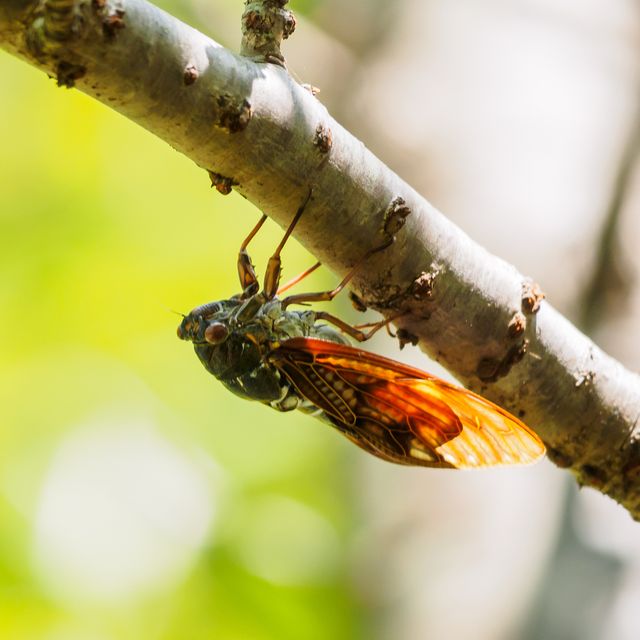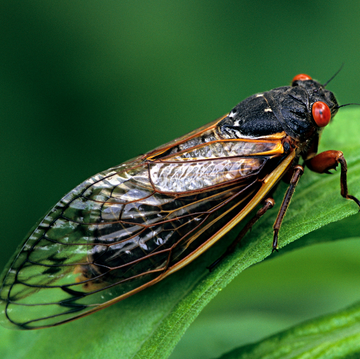As if murder hornets weren’t enough in WTF insect news this year, there’s another freaky one to have on your radar: zombie cicadas.
These cicadas, which are infected with a parasitic, psychedelic fungus called Massospora, have rotting bodies and engage in weird “hypersexual” practices, according to Matthew Kasson, Ph.D., associate professor of plant pathology and mycology at West Virginia University. Kasson and Brian Lovett, Ph.D., a post-doctoral researcher at West Virginia University, co-authored a study on these zombie cicadas that was recently published in the journal PLOS Pathogens.
For the study, the researchers gathered hundreds of periodical cicadas that were infected with Massospora and studied their behavior. Periodical cicadas, in case you’re not familiar with them, emerge in droves every 13 to 17 years. They’re a different species from annual cicadas, which usually appear in July and August each year, Kasson says.
But zombie cicadas actually aren’t a new thing. “The fungus that causes this behavioral modification was first described in the 1870s,” Kasson says. It’s been studied a few more times, notably in the 1960s and 1970s, but “it has pretty much remained a microbiological oddity.” The ones studied by Kasson and his team engaged in some freaky behaviors, including having the fungus control their minds (yes, really).
Typically, it’s periodical cicadas that become “zombies.” Given how rarely they surface, it can be tough to study them, Kasson says. Still, his team managed to find out a few things. Here’s everything you need to know about these strange insects.
What do zombie cicadas look like?
At quick glance, zombie cicadas look like your typical cicadas, so they have stout bodies, broad heads, clear-membrane wings, and large compound eyes, per National Geographic.
But zombie cicadas have a key feature that makes them stand out from other cicadas: Their genitals, butt, and abdomen, have been replaced with white fungal spores that start “sloughing off,” Kasson says.
Despite the fact that part of a zombie cicada’s body is made up of fungus, Kasson says there’s no evidence that zombie cicadas have shorter lifespans than healthy cicadas.
How do zombie cicadas behave?
This is where things get really interesting. Massospora contains chemicals, including ones that are found in hallucinogenic mushrooms, and that can mess with the minds of zombie cicadas.
“The fungus produces really interesting psychoactive compounds, one of which is amphetamine, which would give increased stamina and prolonged wakefulness in the cicadas,” Kasson says. So, zombie cicadas may be able to fly around more and stay up longer than regular cicadas (as if they don’t make enough noise already).
They’re also big on mating. “Infected males will mate with females, but they’re unsuccessful because their backside is a fungal plug,” Kasson says. “At the same time, they’re spreading this fungus around like an STD.”
Infected males are so hypersexualized in fact, that they’ll pretend to be females so that other males will mate with them, exposing those healthy males to the fungus in the process, Kasson says.
And then there’s a really creepy thing that can happen when a healthy male tries to mate with an infected female. The abdomens of infected females are “a lot slower to fall off” than males and, due to that, an infected female’s genitalia will crumble and break off after a male mates with her. “The male will then fly around with female genitalia still attached to them,” Kasson says. “It shows how grotesque, but fascinating these fungal parasites are.”
Can zombie cicadas hurt you?
Ick factor aside, Kasson says they’re mostly harmless to humans. However, he warns against eating zombie cicadas, something he’s genuinely been asked about given the psychoactive compounds produced by the fungus.
“Some of the compounds are toxins and if one were to consume an infected cicada fungal plug, they would probably get sick,” Kasson says. (Also, he notes that people would probably have to eat dozens to get high, so there’s that, too.)
Otherwise, “cicadas pose no risk to humans,” Kasson says—even hypersexualized ones with rotting bodies.
Support from readers like you helps us do our best work. Go here to subscribe to Prevention and get 12 FREE gifts. And sign up for our FREE newsletter here for daily health, nutrition, and fitness advice.












